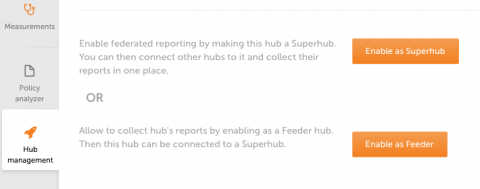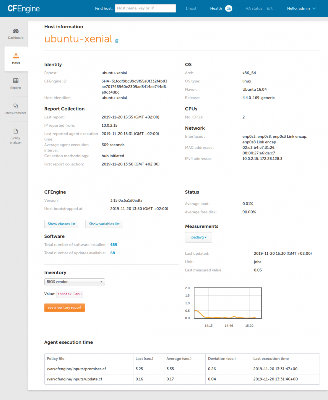Operations | Monitoring | ITSM | DevOps | Cloud
CFEngine
Developer demo: Using cf-keycrypt to encrypt host-specific secrets
Modernizing the CFEngine Project - Vratislav Podzimek & Ole Herman S. Elgesem (Cfgmgmtcamp 2020)
CFEngine 3.15 LTS released
Today marks a new milestone for CFEngine, with the release of the new CFEngine 3.15.0 LTS. This is the newest Long Term Supported CFEngine series, introducing a lot of great stuff. The biggest new feature in CFEngine 3.15 is Federated Reporting, which we will cover later in this blog post, but there are many other new improvements as well. If you are interested to learn more, schedule training, or hear about pricing options, feel free to reach out to us!
CFEngine 3.10.7 LTS and 3.12.3 LTS released
We are now happy to release two new LTS versions of CFEngine, 3.10.7 LTS, and 3.12.3 LTS. This will be the last release of the CFEngine 3.10 LTS series. Standard Support of CFEngine 3.10 LTS ends end of this year. If you would like extended support, please contact us. From the CFEngine release schedule, we see that CFEngine 3.10 LTS is maintained and supported until December 28th, 2019.
New CFEngine Hub packages released
Due to a number of vulnerabilities found in the version of Apache we bundle with CFEngine Hub, we have upgraded the CFEngine Hub packages to use an updated version of Apache. We upgrade from Apache 2.4.39 to Apache 2.4.41. We are now releasing a new version, CFEngine Hub 3.12.2-5. Only new Hub packages are being released, as no other packages are affected by these vulnerabilities.
Speeding up PostgreSQL ETL pipeline with the help of GODS
When working on the new Federated Reporting feature for CFEngine we had to solve the problem of collecting data from multiple CFEngine hubs (feeders) on a single hub (superhub). CFEngine hubs are using PostgreSQL to store data, so, more specifically, the problem was how to collect data from multiple PostgreSQL databases in one PostgreSQL database.
CFEngine priorities for 2020
This is a very exciting time for the CFEngine product team, the community, and the user base. As we are getting closer to the release of CFEngine 3.15 LTS, we can look back at some great improvements in the last few years.
CFEngine 3.15 LTS beta released
Today we are happy to announce the general availability of CFEngine 3.15.0 beta. CFEngine 3.15 is our upcoming LTS (Long Term Support) release. The main focus of this release has been the new Federated Reporting feature. It also contains a lot of performance work and stability improvements.
CFEngine 3.12.2-3, 3.14.0-2 released (mitigating CVE-2019-10164)
On [2019-07-29 Mon] we released new builds of our Enterprise Hub packages for 3.12.2 and 3.14.0. This release addresses CVE-2019-10164. PostgreSQL versions 10.x before 10.9 and versions 11.x before 11.4 are vulnerable to a stack-based buffer overflow. Any authenticated user can overflow a stack-based buffer by changing the user’s own password to a purpose-crafted value. This often suffices to execute arbitrary code as the PostgreSQL operating system account.







